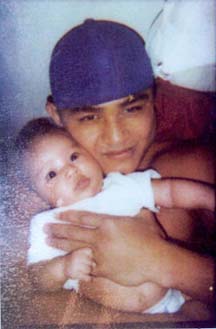
[ OUR OPINION ]
Senseless tragedies
are easily preventedHORRIBLE auto accidents like the two-car collision that killed four young people Monday are routinely followed by calls for tougher laws, increased police vigilance and other actions to curb whatever conduct or behavior is identified as the cause. While laws and sanctions may discourage speeding, racing and recklessness, nothing works better to prevent accidents than driving responsibly.
THE ISSUE
Authorities are trying to sort out conflicting accounts of a car wreck in Makaha that killed four young people.
The roster of dead in the Makaha crash is particularly grievous considering the ages of the victims: 18, 20, 21 and 24 years old. A 19-year-old who was thrown from the speeding car survived with no injuries save a broken leg, given "another chance," as his father told the Star-Bulletin. Two others, ages 18 and 19, who were in a car struck by the first, also escaped serious injury.
DENNIS ODA / DODA@STARBULLETIN.COM
Josh Mendoza cuddles his son, now fatherless, in a picture placed at the scene of Monday's fatal car wreck in Makaha.
The ones who weren't as lucky are entered on a list of statistics -- 80 traffic fatalities on Oahu so far this year as compared to 66 at the same time in 2002. The numbers belie the pain and suffering the dead leave behind as their families and friends try to sort out for police who was driving or speeding or racing or not while arranging funerals and all-too-common roadside memorials for their loved ones.
Meanwhile, state lawmakers consider the usual proposals -- more severe penalties than fines for chronic speeders and confiscation of vehicles for street racers. Police administrators look for ways to increase patrols while maintaining that laws restrict their authority and a dearth of officers blunts their ability to nail scofflaws.
The driving public criticizes "the other guy" and howls at attempts to curb speeding, like the despised traffic cameras, a program so poorly conceived that its worthy goal was lost in the clamor. Cars designed to cocoon motorists and passengers seduce them into thinking they are safer than they really are. Then there are the self-absorbed who view their desires as above all others to rationalize their disregard for red lights and speed limits.
People see the video on television and photos in the newspapers, grimly shaking their heads at the images of twisted metal and broken bodies, but these are quickly forgotten the next time they encounter a slower driver on the freeway, are late for an appointment or are impatient to meet friends for an after-work drink.
So, soon there will be another tragedy, and more boyfriends and girlfriends, fathers and sons, mothers and daughters to mourn who, had one driver taken a moment to think, to acknowledge the dangers on the roads, would still be alive.
BACK TO TOP |
Be on the safe side,
go get your flu shotHAWAII has escaped the widespread outbreaks of flu that have hit at least 24 states, but a recent increase in cases here may be a preview of things to come. Those especially vulnerable -- the elderly, children ages 6 to 23 months and people with chronic diseases -- should heed health officials' advice and get flu shots.
THE ISSUE
The number of flu cases in Hawaii has been creeping up in recent years.
The typical flu season in the islands stretches from October through May, but because of location and the coming and goings of tourists and residents, officials monitor flu-type illnesses year round. In the past two weeks, the number of cases has gone up, although Hawaii has yet to see the particularly harsh Fujian strain that's causing concern elsewhere.
The Centers for Disease Control and Prevention yesterday added 11 states to the 13 already experiencing widespread flu. Among them are all Western states, except California and Idaho.
Nevada, which many Hawaii residents favor for vacations in Las Vegas and Reno, is on the list, a concern as health officials say cases usually increase after the holidays when travelers return home.
Because the virus is spread from person to person, with adults contagious as long as seven days after symptoms appear and children longer, sick people should stay at home to contain the virus and to forestall serious complications. At least nine children in Colorado have died, an indication that children may be more susceptible.
Fortunately, Hawaii -- unlike other states -- has an adequate supply of the vaccine. We hope you will take advantage of that.

